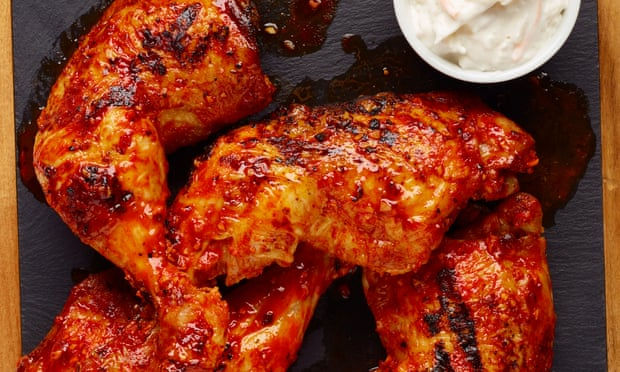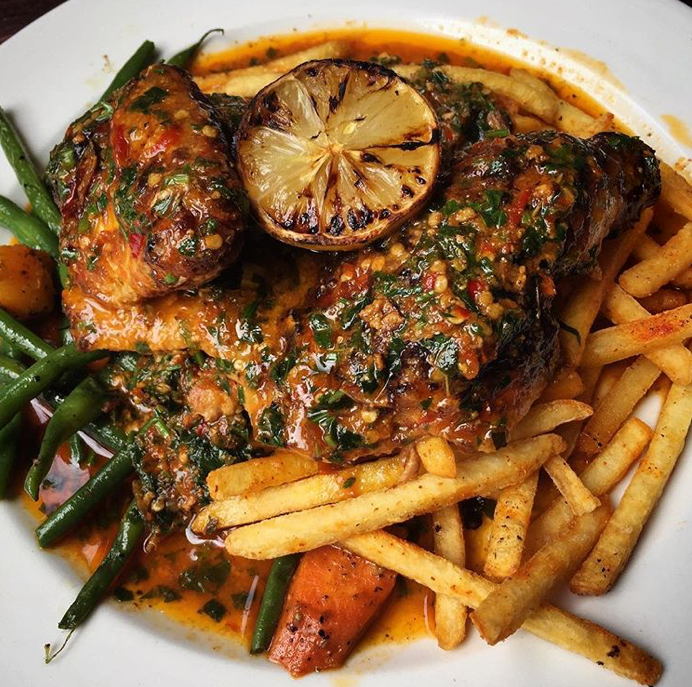And - piri-piri, peri-peri or pili-pili or even Frangos no espeto à minha moda
- Nov 6, 2018
- 5 min read
"Variations of the sauce have been around since the 15th century when the Portuguese settlers in Africa came across the ingredient – an African bird’s eye chilli – and made a marinade with garlic, red wine vinegar, paprika and other European imports. Five hundred years on, the exact origins of this recipe are still debated as both Portuguese-Angolans and Portuguese-Mozambicans claim to have created the special mix. Regardless, the recipe remains a celebration of the cultural legacy and culinary fusions of the region." Siobhan Hegarty SBS

Is it Portuguese or is it African? I thought it was Portuguese and I made a version on Saturday for we had friends to lunch, two of whom had recently returned from a holiday in Portugal, so for the lack of other inspiration I decided to go Portuguese.
I have one, now rather ancient, book on Portuguese food, called Portuguese Cookery by Ursula Bourne. I'll write another time about Portuguese food in general, but anyway there was indeed a recipe in the book for Frangos no espeto à minha moda in which a chicken is roasted with lemon and parsley and finally basted with piri-piri sauce and grilled. However her piri-piri sauce is merely, olive oil with dried chillie soaked in it and she says. "Tabasco sauce can be used equally well." So I suspected not very authentic. But I now think that yes this may be authentic and the other more complicated versions are African rather than Portuguese in spite of the tradition being started by those long ago Portuguese colonists. SBS seems to think so too:
"Well first up, it’s piri-piri not peri-peri, and second, in Portugal you’re less likely to find a rich, spicy sauce than a simple chilli oil."
So Ursula Bourne, whoever she was, was very possibly right.
Jose Silva - whose recipe I finally used - maintains that when the African Portuguese colonies got their independence and the Portuguese returned to Portugal they brought the more fiery and spicy version back with them.
Anyway having finally decided to indeed do a piri-piri chicken I decided not to do this version, even though it may indeed have been the original concept.
It's one of those dishes that owes its origins to the great age of exploration in the fifteenth and sixteenth centuries, which resulted in Italy discovering tomatoes, the Spanish capsicum, the English potatoes and the rest of the world chilli. The Portuguese back then were one of the leading exploring and colonising countries and they took the chillies they found to their colonies in Goa in India and Angola and Mozambique in Africa. Nowadays the 'authentic' chilli pepper for piri-piri is itself called piri-piri. The swahili for piri-piri is pili-pili and
"apparently means pepper-pepper – prompting the witticism “the chilli so hot they named it twice” Felicity Cloake
It's not the very hottest chilli in the world but it's definitely up there. Anyway the Africans took to it and combined it with a love of cooking over charcoal to produce the dish that apparently inspired the founders of Nando's to launch their peri-peri chicken. And as far as I can see this is where the peri-peri comes from.
So here is an aside on Nando's. It was founded back in 1987 in Johannesburg by Robert Brozin and Fernando Duarte after whom the company is named. They were later joined by one Dick Enthoven and so successful was their business that it is now a world-wide franchise. So peri-peri chicken as most of us know it is basically South African, not Portuguese, though via the Portuguese colonists.
The company has a rather nice website. I think it has recently undergone a makeover, as has the whole organisation. The logo has become simpler:
but still features the chirpy chicken, if you can call a chicken chirpy. There is a page - with a quirky legend about a magic cockerel which is apparently displayed in all of their stores. Overall the vibe is of a company doing good things - sourcing their chillies from small farmers in Africa, helping in the fight against malaria and so on. However their new 'look' - based on African designs - it's all explained on the website - has apparently been causing problems with some franchisees going bust and the company as a whole losing money. There are claims by franchisees that they have had to pay from their own money for the very expensive makeovers - one of our own local Nando's - in Greensborough was one of those making a case of bullying against them. So who knows.
And not only do they have their restaurants - which somebody claimed was set somewhere between McDonalds and Pizza Express, but they also have their bottled sauces. I almost bought one of them from my local supermarket instead of making my own, though I mentally slapped myself on the wrist and resisted the impulse. You can buy it in different strengths and with slightly differing tastes. They say:
"Our PERi-PERi sauces, bastes and marinades deliver flavour first, heat second. They all have a citrus note, a tease of heat and a hint of earthiness. Our sauces’ flavours build and subside rather than the ‘all out burn’ of other chilli sauces." Nandos
The picture at the top of the page is from one of their restaurants. And I have had a Nando's once - and it was quite tasty I have to say.
Well others seem to differ on this. I have to say that there was a vast range of options out there when it came to choosing a recipe. I finally chose one from SBS - they have several, which consisted of marinading the butterflied chicken overnight in a paprika, lemon and bay flavoured mix, cooking it on the weber the next day and finishing it off by basting with the sauce for the last bit of cooking. And I have to say that really it didn't taste of anything much more than a rather nice webered chicken. I was disappointed, but then I used very mild chillies, being somewhat daunted by my chilli hating husband.
As I perused the web I could see that there were some commonalities. Paprika, chillies of course, though there seemed to be disagreement as to how hot they should be, lemons or wine vinegar (or both in my case), garlic - lots, and bay leaves. But even given this small range there was a much larger range of how they were used. Felicity Cloake does a reasonably good survey of the options although I'm not sure about some of her sources. Her version looked like this:


Here in Australia one of the foremost proponents of this dish seems to be a chef called Duncan Welgemoed who is South African by birth and has a restaurant called Africa in Adelaide. SBS mentions him and Gourmet Traveller has a recipe by him, which looked rather complicated.
There is also another chain called Oporto started by an Australian Portuguese called Antonio Cerqueira in North Bondi in 1986 - so just a little older than Nando's. He now has a whole lot of franchised shops - I think mainly in NSW and WA.
So there you go peri-peri chicken seems to be what you get from Nando's. If you go to Portugal it's piri-piri chicken and if you speak Swahili it's pili-pili. Otherwise known as Portuguese charcoal chicken, even though it's actually African. With chips of course, which are neither Portuguese nor African. Looks yummy in an unhealthy sort of way.

















Comments